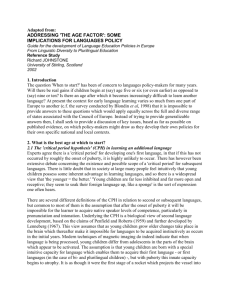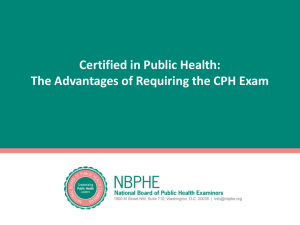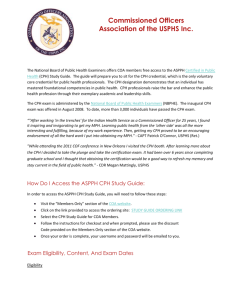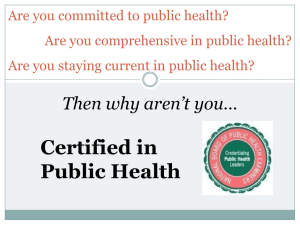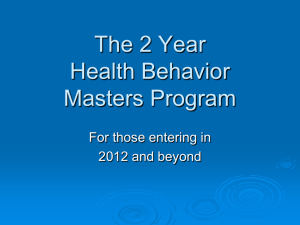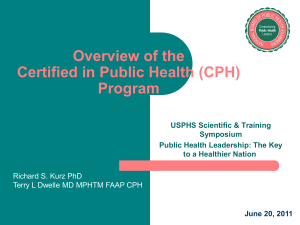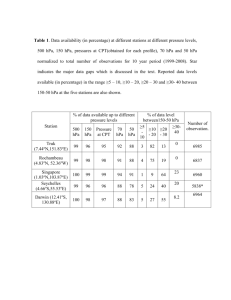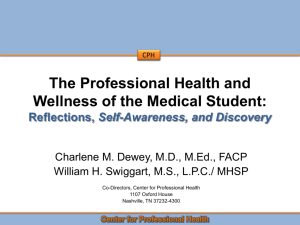Certified Public Health (CPH) - Tennessee Public Health Association
advertisement
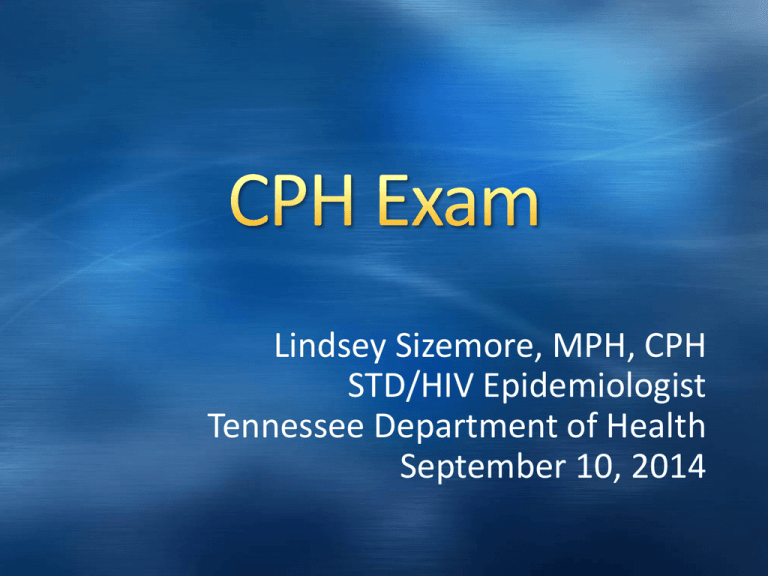
Lindsey Sizemore, MPH, CPH STD/HIV Epidemiologist Tennessee Department of Health September 10, 2014 Certificate of Public Health Offered by the National Board of Public Health Examiners (NBPHE) Graduated from an accredited Public Health program by the Council on Education for Public Health (CEPH) Mastered foundational competencies in public health There are two parts to the CPH credentialing process: Passing the CPH Exam A recertification process to maintain the certification U.S. does not currently require any license to be hired in public health Voluntary credential that demonstrates core knowledge of public health Employers are preferentially hiring and promoting CPH professionals You must meet one of the following eligibility criteria: Alumni of a program of public health accredited by the CEPH Current student of a school or program of public health accredited by the CEPH Must have completed 21 core credit hours by the time the exam is administered Starting with the October 2013 exam, individuals who have taken the five core classes at a CEPH-accredited institution are also eligible to sit for the CPH exam as long as they meet either of the two additional eligibility criteria: Minimum of five years of public health experience Possession of a relevant graduate degree The Certified in Public Health (CPH) exam covers the five core areas of public health and crosscutting areas relevant to contemporary public health The examination was crafted to assess a person’s knowledge of these competencies, regardless of academic concentration Five Core Areas Biostatistics Environmental Health Sciences Epidemiology Health Policy and Management Social and Behavioral Sciences Cross-Cutting Area Communication and Informatics Diversity and Culture Leadership Public Health Biology Professionalism Programs Planning Systems Thinking Registration is now open for the 2014-2015 exams Computer Based Exams will be offered on: October 4-25, 2014 February 9-28, 2015 June 1-30, 2015 October 1-31, 2015 Candidates can register at: https://www.nbphe.org/registrationcenter.cfm Testing sites in Tennessee for Computer-Based tests are held at H&R Block Offices in the following cities: Chattanooga: 2200 Hamilton Place Boulevard Johnson City: 3302 West Market Street Knoxville: 308 North Peters Road Memphis: 3566 Summer Avenue Nashville: 2941 Nolensville Pike The exam fee is $385.00 It is not refundable; however, it is deferrable As of November 2009, the NBPHE is approved to offer the CPH exam through the U.S. Department of Veteran’s Affairs. Veterans and their eligible dependents may qualify for reimbursement of the CPH exam costs through their veteran’s education benefits CPH Exam: Quick Reference Review by Larry Holmes, Jr. The cost is around $60.00 (new and used) for paperback or Kindle Edition There are also practice questions, webinars, and a full length practice exam available on the NBPHE website: www.nbphe.org The exam consists of 200 questions and is timed (4 hours) Some questions are: matching items, part of a series of questions relating to a common narrative, or have associated charts Blank answers are automatically marked as ‘incorrect’ so it is better to guess if you are unsure of the answer Sample Exam Questions A pilot study is conducted to examine whether a new drug effectively decreases cholesterol levels over a six-week period. Twelve participants are enrolled, and serum cholesterol levels are measured before and after the six-week treatment period. Investigators plan to use a paired t-test to examine whether the drug was effective in reducing cholesterol levels. The paired t-test is more appropriate for analysis of the results than a two-sample t-test for which of the following reasons? A. B. C. D. E. Dependence between the pre-test and post-test measurements Elimination of noise due to confounders Heterogeneous variances of the two groups Non-randomness of the timing of the measurements Potential non-normality of the responses Which of the following is a priority air pollutant regulated by the National Ambient Air Quality Standards (NAAQS)? A. B. C. D. Asbestos Carbon Dioxide Methane Ozone Obesity interventions often utilize community trials to increase physical activity. These trials are usually part of a “Healthy Heart” program and incorporate social and environmental measures, including public service announcements about physical activity and total well-being. This approach in terms of a health behavior model is best described as the: A. Transtheoretical Model B. Health Belief Model C. Social Support Model D. Ecologic Model E. Information, Motivation, and Skill Building Model What percentage of all spending on health in the United States is devoted to public health funding? A. B. C. D. 3% 11% 28% 52% In a case-control study of osteoporosis, investigators examined 100 women as cases and an equal number of women as controls and found low-calcium intake in 40 of the cases and 20 of the controls. What is the odds ratio in the association between low-calcium intake and developing osteoporosis in this population? A. B. C. D. E. 1.53 15.3 2.66 26.6 Cannot be determined from the information provided The CPH exam is scored overall as pass/fail Candidates who pass the exam are notified that they passed Candidates who fail the exam receive a score report that includes: Total score for the entire exam; Separate scores for each of the 5 core competencies; Separate score for all cross-cutting competencies combined To determine the minimum passing standard for each new test, experts examine each item for: Performance (i.e. was the answer chosen as expected or was the item clearly confusing) Difficulty (again, based on the performance and based on expert opinion) Usefulness in contributing to the overall score (i.e. if 100% of examinees answered it correctly it is not an informative item) The first CPH exam was offered across the world in August 2008 To date, more than 3,500 individuals have passed the CPH exam The passing rates for CPH exams to date are: 84% in 2008 74% in 2009 88% in 2010 86% in 2011 84% in February 2012; 82% in October 2012 85% in February 2013; 76% in October 2013 79% in February 2014 Performance by Domain Biostat Avg. 78% Cross Avg. 77% BSS Avg. 75% EOH Avg. 74% HPM Avg. 70% Exam results will be available 45 business days after the last day of the testing window Results are sent by U.S. Postal Service NBPHE will verify every candidate's eligibility with their academic institution When you pass the exam and all requirements have been verified, you will be Certificate in Public Health, and can add the initials CPH to your name and degree Must earn 50 recertification credits (hours) every two years All credits must be earned in the current recertification period; no roll over of recertification credits will be accepted All credits are entered into the recertification portal on the NBPHE website There is a renewal application fee of $95.00 for each recertification cycle “Public health is critically important in the protection and promotion of health and the prevention of disease. The CPH provides evidence that we as public health professionals have attained a nationally recognized level of expertise to assure the conditions in which people can be healthy. I believe that everyone eligible who is in the field should take the exam.” Adewale Troutman, MD, MPH, CPH Director, Louisville Metro Department of Public Health and Wellness Questions? For additional information, please visit: www.nbphe.org Lindsey.Sizemore@tn.gov


